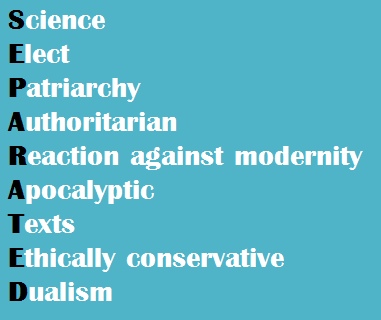Paul Regnier shared the above useful mnemonic for remembering key features of fundamentalism. Here is his further explanation of the points:
Science – Rejection of scientific views when they conflict with sacred texts. However, many fundamentalists have made effective use of modern technology to promote their message.
Elect – The view held by some fundamentalists that they are part of a spiritual elite, chosen by God for a particular mission. In some cases, this may justify violence.
Patriacrchy – The view that men and women have different roles, with women subordinate to men. In fundamentalist groups this is seen as being ordered by God, not the product of culture or history.
Authoritarian – Blind obedience to authority, as opposed to individual freedom and conscience. This may involve obedience to the teachings of a religious text or a religious leader.
Reaction Against Modernity – Fundmentalism is seen as being a reaction against the modern world. Fundamentalists view themselves as being distinct from, and separate to, modern secular society.
Apocalyptic – The view that we are living in the last days, and that the world as we know it will shortly be brought to a sudden end.
Texts – Belief that a sacred text is inerrant (contains no errors). Fundamentalists hold that their sacred texts are literally true, and are hostile towards attempts at historical or literary criticism of them.
Ethically Conservative – The moral commandments of religious texts are seen as being binding for all time. In practice, this tends to lead to a conservative moral position, for example opposing homosexuality.
Dualism – Dividing the world into clear categories of good and evil, right and wrong, “with us” and “against us”. There is little room for ambiguity or grey areas in fundamentalist thinking.
Click through to read the rest. Are there any features you would add, remove, or alter?













